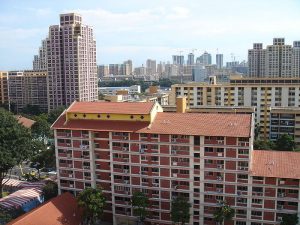Ku Swee Yong, writing for the Straits Times (ST) recently suggested that irreversible, downward pressure may soon be exerted on HDB resale flats due to Singapore’s aging population. Ku pointed to the fact that 2018 marks a landmark year in the history of Singapore – it is the year in which the total number of senior citizens at 65 years old is equivalent to the number of citizens aged 15 and below.
If the current birth rate and mortality rate remain the same in another 12 years, the total number of citizen deaths is expected to exceed the total number of births per year by 2030. Latest population data suggests that the number of senior citizens dying may exceed 30,000 per year by 2030 – close to triple the number in 2016.
The writer argues that these are very worrying statistics for a small nation like Singapore and increased focus has been placed on the healthcare and social support needs of an ageing population, especially following the recently-concluded Budget debate.
Ku believes that the impact an ageing population will have on society will not be limited to spending on healthcare and social support. The nation’s ageing population will have a lasting impact on the housing market, as well, if the birth rate and mortality rate remain constant. According to his commentary in ST, ‘Prepare for supply avalanche as aging HDB flat owners die’, the inevitable deaths of more ageing homeowners is set to trigger a supply avalanche in the property market.
HDB Resale Portal facilitates 2,000 flat owners sell their unit in shorter transaction time
Under current HDB rules, HDB flat owners are not allowed to inherit their deceased parents’ flats. With 80 per cent of Singaporeans living in HDB flats and 90 per cent of these Singaporeans owning the flats they live in, the greatest likelihood is that many of the flats that were owned by Singaporeans who have passed away will most likely be up to be sold on the open market for cash.


About 8,000 HDB resale flats may come to the market by 2030 due to the deaths of ageing homeowners. While supply will be booming at the time, demand might not match up to it.
Ku suggests that given the low fertility rate, fewer young families will be opting for HDB resale flats. This will exert downward pressure on HDB resale flats.
Those who choose to have young families, more often than not, opt for HDB Build-To-Order flats. Those with more cash-flow may opt for non-landed properties or executive condominiums. The writer argues that demand for HDB resale flats may further slow since younger people may prefer to rent or share living spaces, given their familiarity with the sharing economy.
Demand may further plummet due to the ageing of the HDB flats themselves, since they are sold on 99-year leases. The value of flat depreciate over time and this may exert further downward pressure on resale prices. A lot of HDB homeowners faced a shock in March last year when National Development Minister, Lawrence Wong, confirmed that the Selective En bloc Redevelopment Scheme (Sers) will not apply to all flats. Many wondered what it means to have the value of leasehold homes depreciate to zero.
Ku says that there are ways to boost demand – like attracting more foreigners to become permanent residents and citizens to purchase flats or allowing beneficiaries to inherit flats even if they are homeowners – but that changes to public housing policies may be the only lasting solution to combat this problem of high supply-low demand.
He advocated for the policy change of allowing HDB to repossess the flats at resale value and allowing beneficiaries to enjoy the cash proceeds. This he argued, would mean that the flat would not be back in the resale market and HDB could refurbish newer units under the Sale of Balance Flats scheme, at prices reflect the remaining years of lease.
If the authorities continue to increase the supply of new flats, without focusing on how to unwind older flats, the high supply-low demand issue, that will cause the value of HDB resale flats to plummet, may also have a lasting impact on the overall property market, the writer suggested.
Prior to the 2011 General Election, opposition politician Goh Meng Seng challenged the then-Minister for National Development to a housing debate. The challenge was not taken up, The Minister however responded to the Workers’ Party’s suggestion that the prices of new flats should be pegged to the median income of Singaporeans, and said that he was “proud” of the Government’s asset enhancement policy with HDB flats.
